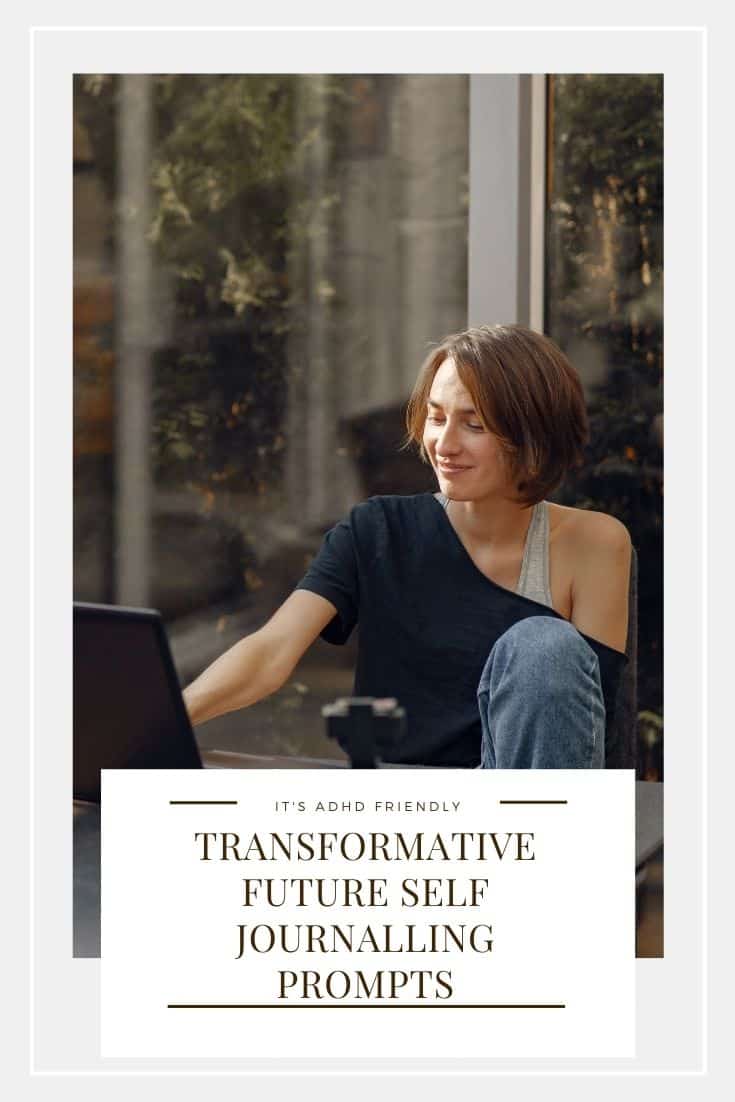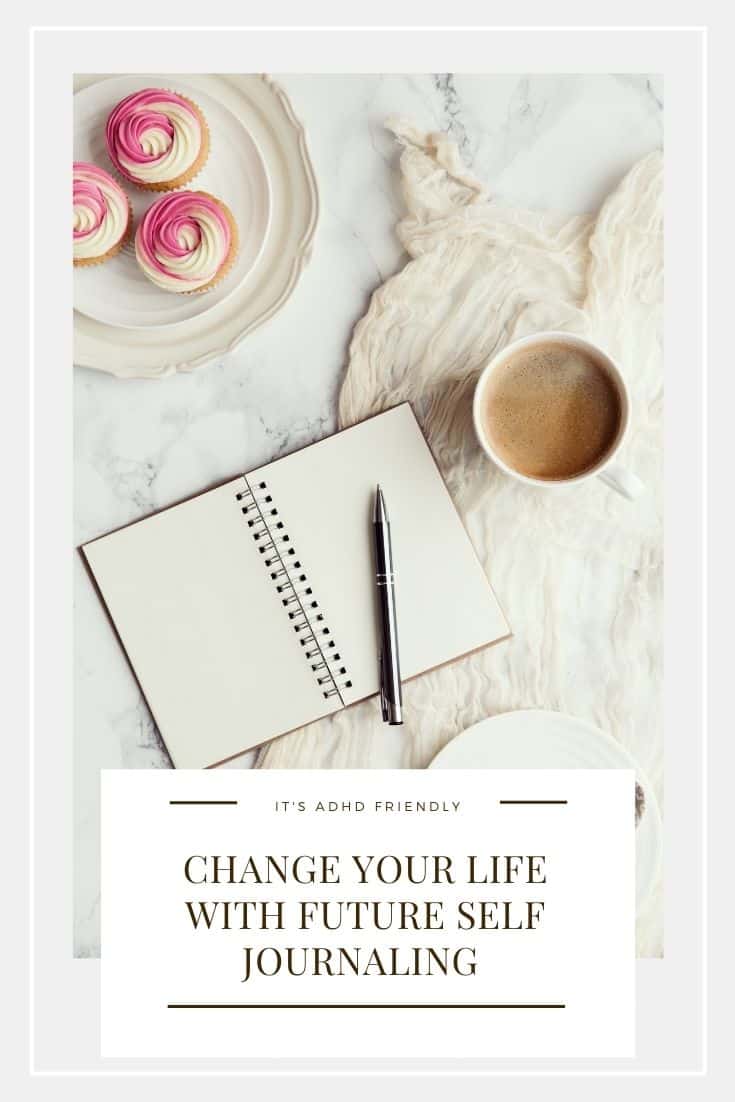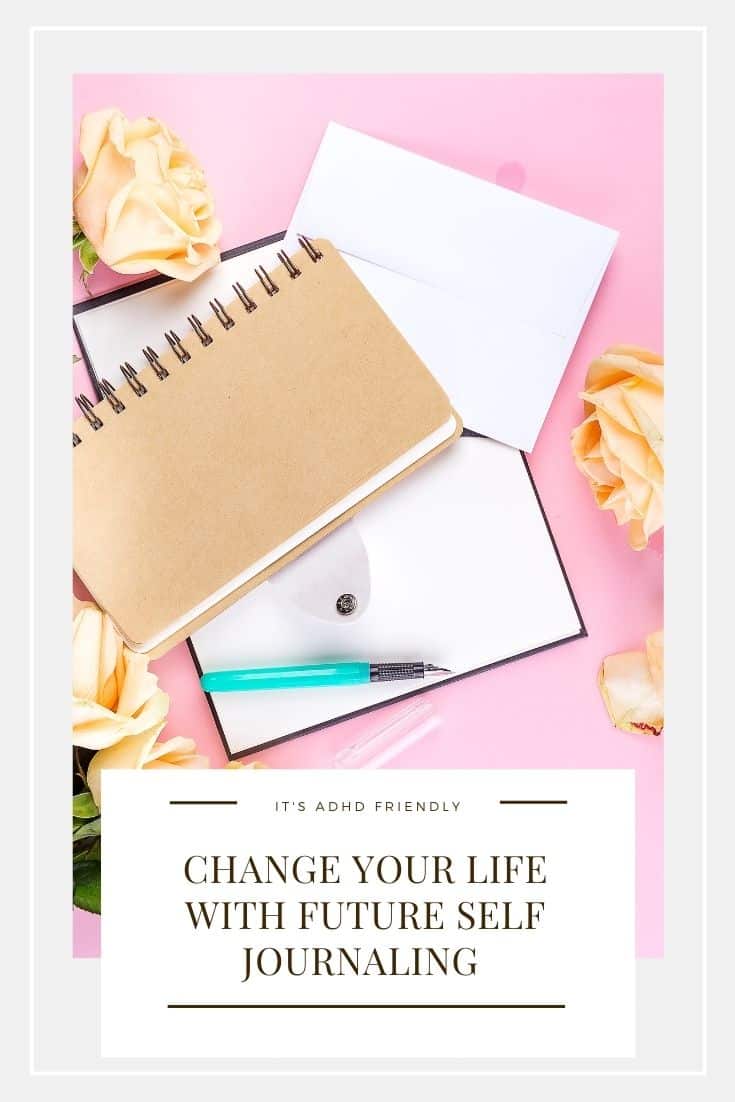Head's up, there could be affiliate links ahead!
Future self journaling is your roadmap to the future you’ve lived a thousand times in your mind’s eye.

Conscious vs Unconscious Thoughts + Feelings
Every day, our brains regurgitate between 50,000 to 70,000 thoughts. Most of them are negative rumination about the past or casting worry about what lies ahead. They take us out of the present moment and into our patterns of behaviors because they’re unconscious, and based on what we already believe about ourselves.
Why are they unconscious? Because in order to have a new thought, we have to be aware of it first.
If we’re having a new thought, it’s because we’ve encountered a new experience, idea or person that has created the opportunity for the new thought to appear in our brain. When it first appears, it’s a conscious thought. If we have a strong feeling about the experience, especially a bad feeling, it gets ingrained at the same time as the thought.
Let me unpack that for you.
You’re rolling out of spin class one day, drenched in sweat and mentally caught up in everything you have to do that day. All of a sudden, a hot guy walks up to you and asks about the water bottle you’re carrying because the name on the bottle is the company he owns.
Feeling blindsided, you blurt out something stupid and scurry away because he’s such a hot guy and you’re such a hot mess. In that moment, you’ve had a new experience, a new thought about yourself (I can’t talk to good looking men without feeling and looking like a moron) and a big fat feeling of unworthiness rises up to wrap that new thought up in a big pink bow.
You will probably go on to dwell and ruminate on that thought for days or weeks to come. You’ll cringe every time you think of it because you could have handled yourself way cooler than that.
Eventually the thought fades into your unconscious to become one of those 50 – 70 thousand random ruminations you have per day, but you’re not really aware of it anymore. You’re also not aware that feeling of unworthiness attached to the unconscious thought that’s also still there – undermining your choices and actions because once again, it’s subtle and below the surface.
How to change our thoughts and feelings to create our future selves
Fortunately, this same process can be used to create thoughts and feelings you actually want to have.
- Have an experience
- Create a new thought
- Attach it to a feeling
The only difference is that this time you’re doing it intentionally and the thoughts and feelings are by design. This is how you become your future self on purpose and the best way I know how to do this is with future self journaling.
Journaling the Future Self
The notion of designing your future self came from the work of Dr. Joe Dispenza. His research in neuroscience has shown that our brains have no way of determining whether or not experiences are real or imagined. So whether you have an awkward encounter with a cute guy or a reflective experience in your journal doesn’t matter. They can both bring about the same beliefs, behaviors and results, so why not harness this process to become who you want to be?
The format of journaling is just one of many ways of creating a future self. In Dispenza’s retreats, attendees work on creating mind movies where they design their ideal selves and the experiences they want to have, into a movie format so they can watch it over and over again. This is something you could do with iMovie and a few images of things you want, but to keep it simple, I love the idea of journaling.

The Science of Journaling
When you journal, the left side of your brain – the judgmental and analytical side – gets busy translating thoughts into words and words onto paper so it’s ability to judge the content is delayed. This gives your right brain, your creative brain, a little time to open up and let loose without the burden of self-criticism. This is a powerful process for removing mental blocks and limiting beliefs that hold you in destructive patterns of thinking like “I can’t do that” or “this will never work”.
In 1992, Julia Cameron published the book, The Artists Way and in it, she talked about morning pages – a process of journaling every morning before your inner critic even woke up. She described it as a way to brain dump all your creative ideas without being beaten down by the person inside you that is resistant to change, growth and self-expression.
Future self-journaling takes a similar approach, but rather than brain dumping, it’s structured around an intention to become something or someone. Through consistency and intention, you can literally recraft your thoughts, feelings and actions to become what you’ve always wanted to be.
Now, I’m not suggesting future self journaling will bring on overnight results. Typically it takes at least 30 days of journaling around one specific behavior or thought that you want to change before you will start to see results. It’s also true that the more ingrained the idea is, the longer it will take to see change happen.
Future Self Journaling is Simple + Accessible
The good news, is that this process is simple, accessible and it feels good to do. The only challenge you may find is the time it takes to get it done every morning. If your mornings are rushed, it’s easy to bypass journaling because kids, work and life all need your attention. But if you can commit to getting up just 10 or 15 minutes earlier every morning, you will have enough time to make this a habit.
Not Sure What to Journal About?
Simply print out the journal prompts, or write the questions down and then answer them in your journal every morning. Just remember – pick one thing to focus on for at least 30 days. Whether you write the same words every day, or respond differently each time you journal doesn’t matter. Just write down what’s on your heart in that moment about that one thing you want to change. Connecting to your heart-centered thoughts and feelings is the key to success with this practice.
More Future Self Journaling Resources
- This is my journal write in. Use any note book you like, but I think your future self deserves a pretty book to come to life in.
- Read more about Dr. Joe Dispenza’s work on developing the future self
- Grab Julia Cameron’s widely celebrated book The Artist’s Way (hint: it’s not just for artists, it’s for anyone who want to get to know themselves better).
- Read more about the psychological and physical benefits of journaling






Shay says
Such a wonderful idea. I just found out that yesterday that I am ADHD, and have been reading and learning about it since. I am 33 years old, and for the longest I can remember, I felt very lost and overwhelmed by my brain. I have never felt more relief than I do now, knowing there’s a name for it, and that there’s a community too. Thank you for this wonderful resource.
P.S. the link to the journal takes to the needs template.
Warmly,
Shay
Caren Magill, MA, CPT, RYT & ADHD Life Coach says
Welcome to the club, Shay! The diagnosis is a huge deal, but it’s just the beginning. Now it’s time to relearn who you are in a much more compassionate and understanding way. It’s really an amazing process.
Thx for the head’s up on the link. I’ll update that now.